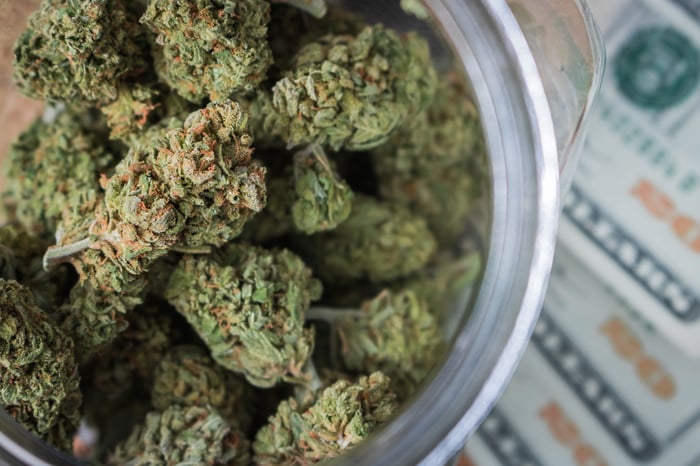Last year, the marijuana industry broke through countless barriers. Having been viewed as a taboo industry previously, the legalization of recreational weed in Canada legitimatized cannabis as an investable industry. Within the next couple of years, Canada's legal pot industry could be generating north of $5 billion in added annual sales.
However, the marijuana industry gaining validity like never before didn't translate into guaranteed success for pot stocks. While some did quite well, many fell flat, including the projected largest producer when at full capacity, Aurora Cannabis (ACB -1.86%). Shares of Aurora Cannabis lost 35% of their value in 2018, despite Canada's game-changing legalization.

Image source: Getty Images.
The makings of an industry giant?
On the surface, Aurora Cannabis looks like a surefire success story. Market share is incredibly important in the early going, and no grower is expected to generate as much weed annually as Aurora Cannabis. Already producing at an annual run rate of 100,000 kilograms, Aurora claims that it'll eventually deliver in excess of 500,000 kilograms per year, although yours truly sees closer to 700,000 kilograms annually following its recent acquisitions. Being able to deliver so much marijuana annually means it'll likely be a beacon for long-term supply deals, and it could become an attractive partner for brand-name beverage, tobacco, and/or pharmaceutical companies.
Aurora should also, presumably, benefit from economies of scale. Growing costs on a per-gram basis tend to be high at the moment, but they're expected to decline over time as the company's infrastructure is put into place. Essentially, the more cannabis Aurora produces, the higher its margins could go as a result of falling production costs.
The company has also done a pretty good job of differentiating its product portfolio and revenue streams. For instance, Aurora has placed an emphasis on high margin cannabis oils with the launch of softgel capsules. Also, its acquisition of Larssen, a consulting, engineering, and construction firm for greenhouses, internalizes some of its construction costs while providing an ancillary stream of revenue.
In many ways Aurora Cannabis has the makings of a cannabis giant... if not for its ongoing dilution.

Image source: Getty Images.
The rise of bought-deal offerings, the pot industry's "necessary evil"
Since Canadian pot stocks have very limited access to nondilutive forms of financing, nearly all have turned to bought-deal offerings to raise capital. A bought-deal offering involves the sale of common stock, convertible debentures, stock options, and/or warrants to an investor or group of investors to raise money. Operating cash flow for marijuana stocks is nowhere near large enough to support capacity expansion efforts, let alone product development, marketing, international expansion, or acquisitions. This means bought-deal offerings are necessary for the marijuana industry.
However, they're also somewhat evil, because they can crush shareholder value. Issuing shares, notes that can be converted to shares down the road, and stock options and warrants that can be exercised into common stock, can balloon the outstanding share count of a publicly traded company. This has the effect of pushing down the share price of a stock, even if the market cap for said stock has increased.
Bought-deal offerings can also do a number on a company's valuation. With more shares outstanding, net income will likely yield a smaller earnings per share figure, increasing a publicly traded stock's price-to-earnings ratio. This is a big reason why Aurora Cannabis' forward P/E is an astronomical 70.

Image source: Getty Images.
Aurora Cannabis: Please stop crushing your shareholders with dilution
For Aurora Cannabis, acquisitions have been a big part of the company's growth prospects. Since the beginning of 2018, it's acquired:
- Saskatchewan-based CanniMed Therapeutics for $852 million
- Ontario-based MedReleaf for $2.5 billion
- South America's ICC Labs for $221 million
- Mexico's Farmacias Magistrales for an undisclosed amount
- British Columbia's Whistler Medical Marijuana for approximately $132 million (this deal was announced last week and hasn't closed)
That's a lot of money that Aurora Cannabis simply didn't have, which meant leaning on its common stock to do the heavy lifting. With the exception of the CanniMed deal, which had a relatively small cash component, each and every one of these acquisitions was entirely facilitated by issuing shares of Aurora's common stock.
I wish I could say that were the end of it, but it's not. Just two days after announcing that it would be acquiring Whistler Medical Marijuana for $132 million in an all-share deal, Aurora Cannabis announced a $250 million convertible note offering, which comes due in 2024. Although this sounds like debt, and the noteholders could hang on to these notes in order to collect interest, they could just as easily convert this $250 million into shares of Aurora's stock. In other words, it's debt masked as more dilution.

Image source: Getty Images.
And I'm still not done. As of the end of the company's first-quarter operating results, it listed close to 22.9 million warrants and 42.9 million stock options on its filing with SEDAR in Canada. This is just a simple way of saying that, in addition to its convertible notes, Aurora's share count is going to continue to rise for the next couple of years as these financing tools are exercised.
After listing 366.5 million shares outstanding as of June 30, 2017, Aurora's share count exploded to 961.8 million by Sept. 30, 2018. Mind you, this still doesn't include the now-closed acquisition of ICC Labs, the purchase of Farmacias Magistrales, the buyout of Whistler Medical, and whatever other options and warrants were executed in the soon-to-be reported quarter. At the pace Aurora Cannabis is on, it could top 1.1 billion outstanding shares in 2019.
If the company were profitable on an operating basis, it might be possible to overlook just how little thought the company's management team has had for its shareholders... but it's not. Big quarterly profits in recent months have been the result of fair-value adjustments and investment revaluations rather than operating improvements. In the fiscal first quarter, the company generated an operating loss of nearly 112 million Canadian dollars.
If Aurora Cannabis is to become the great stock investors believe it can be, its management needs to rein in the dilution, ASAP.
Check out all our earnings call transcripts.





